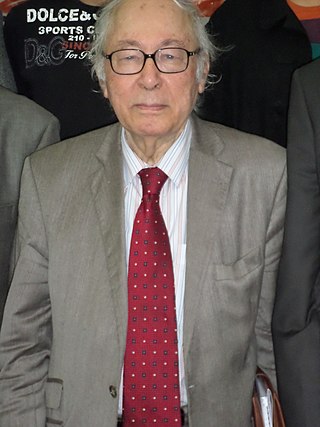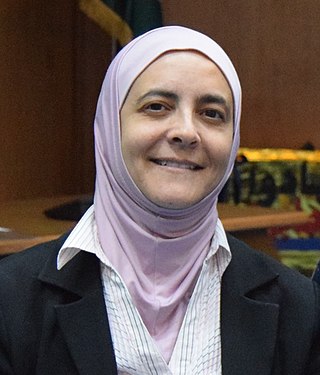Related Research Articles

Fatema Mernissi was a Moroccan feminist writer and sociologist.

Tunisian culture is a product of more than three thousand years of history and an important multi-ethnic influx. Ancient Tunisia was a major civilization crossing through history; different cultures, civilizations and multiple successive dynasties contributed to the culture of the country over centuries with varying degrees of influence. Among these cultures were the Carthaginian – their native civilization, Roman, Vandal, Jewish, Christian, Arab, Islamic, Turkish, and French, in addition to native Amazigh. This unique mixture of cultures made Tunisia, with its strategic geographical location in the Mediterranean, the core of several civilizations of Mare Nostrum.
Sandra G. Harding is an American philosopher of feminist and postcolonial theory, epistemology, research methodology, and philosophy of science. She directed the UCLA Center for the Study of Women from 1996 to 2000, and co-edited Signs: Journal of Women in Culture and Society from 2000 to 2005. She is currently a Distinguished Professor Emeritus of Education and Gender Studies at UCLA and a Distinguished Affiliate Professor of Philosophy at Michigan State University. In 2013 she was awarded the John Desmond Bernal Prize by the Society for the Social Studies of Science (4S).
Islamic feminism is a form of feminism concerned with the role of women in Islam. It aims for the full equality of all Muslims, regardless of gender, in public and private life. Islamic feminists advocate women's rights, gender equality, and social justice grounded in an Islamic framework. Although rooted in Islam, the movement's pioneers have also utilized secular, Western, or otherwise non-Muslim feminist discourses, and have recognized the role of Islamic feminism as part of an integrated global feminist movement.
Jacques Augustin Berque was a French scholar of Islam and sociologist of the Collège de France. His expertise was the decolonisation of Algeria and Morocco.

The roles of women in the Arab world have changed throughout history, as the culture and society in which they live has undergone significant transformations. Historically, as well as presently, the situation of women differs greatly between Arabic speaking regions, their urban or rural population and age groups. Among other factors, these differences can be attributed to local traditions, culture and religion, women's social or legal status, their level of education, health or self-awareness. Since the 19th century, and notably through the influence of the colonization in North Africa, the Arab Renaissance in Egypt, Lebanon, and Syria, and the end of the Ottoman Empire, the social and economic changes in the Arab world have become greatly accelerated and diversified.
Nebiha Gueddana or Nabiha Gueddana, maiden name Ben Aissa, born January 26, 1949, is a doctor and a Tunisian politician. She held several high-level positions at the national and international level.
Philosophy education is the practice of teaching and learning philosophy along with the associated scholarly research. It is not philosophy of education, nor the philosophical study of education in general.
Since the December 2010 revolution in Tunisia and protests across the Middle East and North Africa (MENA) began, Tunisian women have played an unprecedented part in the protests. Habib Bourguiba began instituting secular freedoms for women in 1956, such as access to higher education, the right to file for divorce, and certain job opportunities. Women in Tunisia enjoy certain freedoms and rights that are denied to women in neighboring countries, although the social norms have shifted since 2011.
Mounira Maya Charrad is a Franco-Tunisian sociologist who serves as associate professor of sociology at the University of Texas at Austin.

Abdeljelil Temimi, also transliterated as Abdoljalil Tamimi, is a Tunisian historian. He specialises in the cultural and architectural influences of the Ottomans and Moriscos in the Arab world.

Mezri Haddad is a Tunisian journalist, writer, philosopher and diplomat. Haddad was a doctor of moral and political philosophy at the Paris-Sorbonne University, and the first Muslim candidate to be qualified by the National Council of French universities as a lecturer in Catholic theology. He is the author of several essays that focus on politics and religion.
Margaret Gallagher is an Irish freelance researcher and writer specialising in gender and media. She has carried out research, development and evaluation projects for the United Nations Statistics Division, UNIFEM, UNESCO, the International Labour Office, the Council of Europe, the European Commission and the European Audiovisual Observatory.

Rana Dajani is a Palestinian-Jordanian molecular biologist and tenured professor of biology and biotechnology at Hashemite University. She earned her Ph.D. in molecular biology from the University of Iowa. Dajani is an expert on genetics of Circassian and Chechen populations in Jordan, also on conducting genome-wide association studies on diabetes and cancer on stem cells. Her work in stem cell research initiated the development of the Stem Cell Research Ethics Law and all regulations in Jordan. She is an advocate for the biological evolution theory in relation to the religion of Islam, and believes strongly in the education and empowerment of women, being a member of the United Nations Women Jordan Advisory Council. She is the recipient of the Jordan's Order of Al Hussein for Distinguished Contributions of the Second Class.

Fatma Chamakh-Haddad or Fatma Haddad-Chamakh was a professor, philosopher, feminist and Tunisian activist.

Sophie Bessis is a Tunisian-born French historian, journalist, researcher, and feminist author. She has written numerous works in French, Spanish, and English on development in the Maghreb and the Arab world, as well as the situation of women denouncing the identity imprisonment to which they are subjected. She is the recipient of the Paris Liège literary prize and was honored as Commandeur of the Order of the Republic.
Abdelwahab Bouhdiba was a Tunisian academic, sociologist, and Islamologist.

Essma Ben Hamida is a Tunisian schoolteacher, journalist and entrepreneur. After opening and operating a branch of the Tunisian news agency TAP at the UN Headquarters in New York, she returned to Tunisia and together with her British husband, Michael Cracknell, founded Enda inter-arabe in 1990 on the basis of Enda Third World. As Enda Tamweel, it has since become a highly successful microfinance institution for women, admitting men providing their wives act as guarantors. In 2010, Ben Hamida was honoured as "Outstanding Social Entrepreneur in the Middle East and North Africa" by the Schwab Foundation and the World Economic Forum.
Juliette Bessis was born in 1925 in Gabès, Tunisia, and died 2017 in Paris, France. She was a contemporary Tunisian scholar and historian specializing in the Maghreb region of northern Africa.

Najla Bouden, also known as Najla Bouden Romdhane, is a Tunisian geologist and university professor who is serving as the Prime Minister of Tunisia. She took office on 11 October 2021, making her the first female prime minister both in Tunisia and the Arab world. She previously served in the education ministry in 2011.
References
- ↑ Lilia Ben Salem and Sylvie Mazzella Propos sur la sociologie en Tunisie, Geneses, No. 75 (2009), pp.125-142
- ↑ Alia Baffoun, Contribution à l'étude des pertes d'effectifs scolaires dans les pays du Tiers Monde : l'exemple de la Tunisie [Contribution to the study of the loss of schoolteachers in Third World countries: the example of Tunisia]. Paris: University of Paris V, 1969.
- ↑ UNESCO Document by Twelve "Experts on Research, and Teaching Related to Women", Paris, May 1980, Women's Studies Newsletter, Vol. 8, No. 4 (Fall/Winter 1980), pp.22-24.